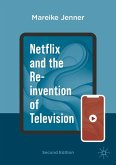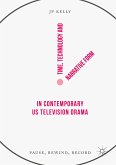This book deals with the various ways Netflix reconceptualises television as part of the process of TV IV. As television continues to undergo a myriad of significant changes, Netflix has proven itself to be the dominant force in this development, simultaneously driving a number of these changes and challenging television's existing institutional structures. This comprehensive study explores the pre-history of Netflix, the role of binge-watching in its organisation and marketing, and Netflix's position as a transnational broadcaster. It also examines different concepts of control and the role these play in the history of ancillary technologies, from the remote control to binge-watching as Netflix's iteration of giving control to the viewers. By focusing on Netflix's relationship with the linear television schedule, its negotiations of quality and marketing, as well as the way Netflix integrates into national media systems, Netflix and the Re-invention of Television illuminates the importance of Netflix's role within the processes of TV IV.
Dieser Download kann aus rechtlichen Gründen nur mit Rechnungsadresse in A, B, BG, CY, CZ, D, DK, EW, E, FIN, F, GR, HR, H, IRL, I, LT, L, LR, M, NL, PL, P, R, S, SLO, SK ausgeliefert werden.









